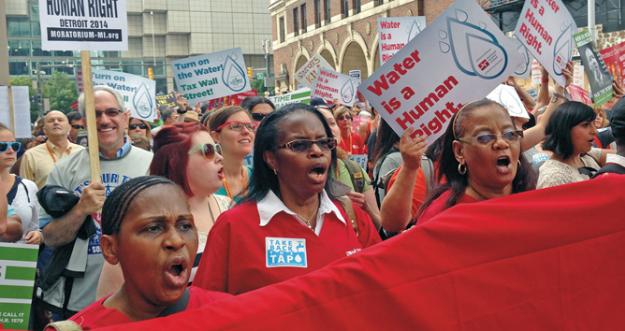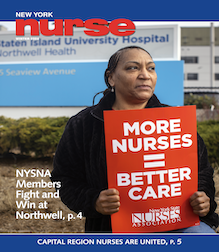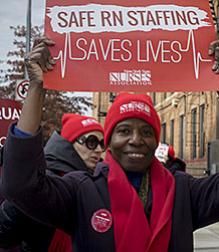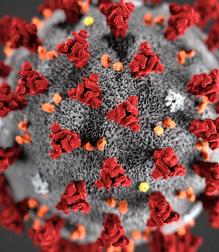
On block after block, businesses are shuttered, homes foreclosed by the thousands. Detroit is a city in bankruptcy, a city on the auction block, its population fighting demise at every turn. So bad are conditions that 17,000 households and small businesses were without water in July, a shutoff caused by profound poverty in the form of inability to pay the water bill. That leaves some children with no water with which to brush their teeth.
NYSNA nurses joined thousands of protesters, including nurses in the Michigan Nurses Association and other RNs of National Nurses United, in strong protest on July 18, demanding the water be turned on, and left on.
“We cannot afford to have sick people or have the healthcare system comprised if there’s not clean water,” said Patricia James, RN, who came in from Brooklyn’s Kings County Hospital Center. “This is a great health issue.”
Detroit’s water shutoff stands in contravention of the laws and principles of the United Nations, which formally recognize “the right to safe and clean drinking water and sanitation” as “a human right that is essential for the full enjoyment of life and all human rights.”
Once a metropolis
Once a thriving metropolis and backbone of blue-collar black America, when Chrysler alone represented 1% of the payroll of the entire U.S. black population, Detroit is unraveling fast. For the Michigan’s largest city, industrial displacement became the model, as factories moved to non-union settings here, Mexico and overseas, abandoning the workforce that built the brand and enriched the shareholders
Detroit may be an extreme example of de-industrialization, but it is not alone. NYSNA members see the effects of enduring economic hardship and inequality on the healthcare of communities around New York State, as patients in need of essential healthcare forewent that care for years because they simply could not afford it. They arrive now in hospitals with illnesses made worse by the delays incurred by empty wallets, with the greater acuities that comes with care delayed. [See Furillo column, p. 4]
Still, the very profound impoverishment of living without water stands out, casting a pall on the Detroit protests. How could it be that in the richest country in the world – by far – thousands of Detroit families could be without water? Emotions were running high the afternoon of protests. And representatives of labor, NYSNA included, spoke out loud and clear.
“This is what our union does: not only speak on behalf of wages and work, but on behalf of humans,” said Patricia Morris, RN, of Dr. Susan Smith McKinney Nursing & Rehabilitation Center in Brooklyn.
“Let’s transform this crisis of shutting off the water into a golden opportunity to meet the needs of the people,” said John Armelagos, RN and president, Michigan Nurses Association.
As protesters looked around at a city where more than the half the street lights do not work, where 20,000 properties a year – 5% of Detroit’s housing stock – are forced into foreclosure, and where more than 100,000 properties have been razed, erased altogether from once-thriving neighborhoods, the magnitude of catastrophe sent a shudder. “What I see is that we all need each other,” said NYSNA’s Lesline Brownn-Hazel, RN, of East New York Diagnostic & Treatment Center. “We have to unite.”
As of July 1, more than $89 million was owed on nearly 92,000 past-due residential and commercial accounts.
A temporary reprieve won
The march helped invoke a temporary reprieve, when Detroit’s shutoff was suspended for 15 days. The city’s Water and Sewerage Department was transferred out of the hands of State-appointed emergency manager Kevyn Orr to Detroit Mayor Mike Duggan. That reprieve appears to be temporary, as authorities sort out the process of informing residents about delinquent bills.
The underlying issue, of rebuilding the economies of communities left out of a promised national recovery, remain elusive, at best. While American profits are soaring today, many communities are not, as the hard-nosed priorities of an economy tied to finance and geared to austerity – cutting back on essential government support – continue to dominate.
But the cries of protest of July 18, “Water is a Human Right: Fight, fight, fight!” are resonating.
Some members of Congress are now asking the Obama administration and the Department of Health and Human Services to intervene in Detroit, in what they contend is a humanitarian crisis. It’s “a little bit inhumane to put it kindly,” said Rep. John Conyers (D-MI) of the water crisis. “Water is a lifeline,” said Rep. Sheila Jackson Lee (D-TX) in late July, “it is a human rights issue and if necessary there should be federal intervention.”




